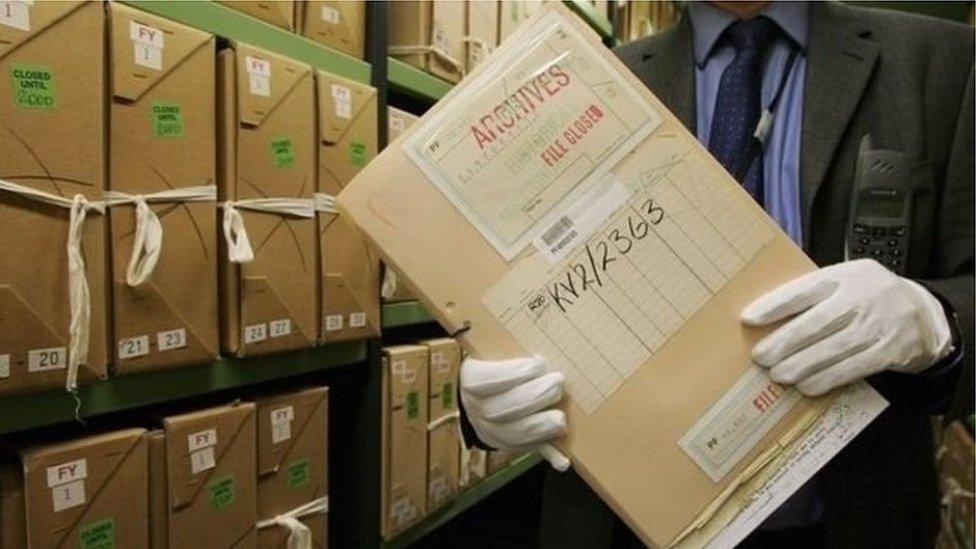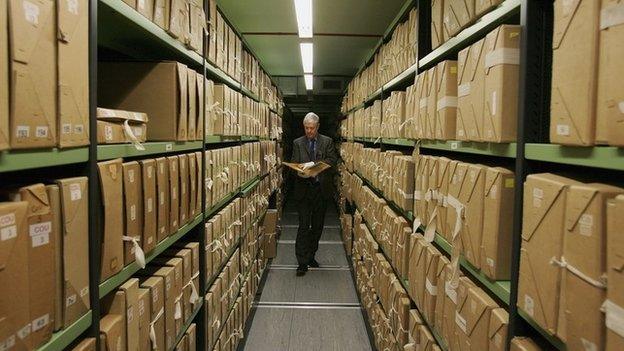Freedom of Information charges ruled out after review
- Published

Freedom of Information requests - used by campaigners and journalists to ask questions of public bodies - are to remain free of charge, a minister says.
Following a review of the law, Cabinet Office minister Matt Hancock said the FoI Act was "working well".
The FoI Commission was asked to examine it amid concerns within government that "sensitive information" was being inadequately protected.
Its report, external said FoI had helped "change the culture of the public sector".
Mr Hancock said there would be no wholesale changes to the FoI Act.
"After 10 years, we took the decision to review the Freedom of Information Act and we have found it is working well," he said.
"We will not make any legal changes to FoI. We will spread transparency throughout public services, making sure all public bodies routinely publish details of senior pay and perks.
"After all, taxpayers should know if their money is funding a company car or a big pay-off."
The government has chosen not to legislate to shore up ministers' powers to veto the release of information.

How does FoI work?

Anyone can use the FoI Act, external to request information held by public bodies, such as the government, councils, schools, hospitals and the police
This can be done by letter, email or fax
Organisations must respond within 20 working days, although time extensions are allowed in certain circumstances, external
Information is usually provided for free, although there may be small charges for postage and photocopying
FoI requests may be rejected for various reasons, external, such as protecting national security or if dealing with the request would cost too much or take too much staff time

The commission said FoI had "enhanced openness and transparency" and concluded that "there is no evidence that the act needs to be radically altered, or that the right of access to information needs to be restricted".
It added: "In some areas, the commission is persuaded that the right of access should be increased."
However, it said parts of the act were unclear and it made recommendations to improve "clarity and certainty".
BBC political correspondent Ross Hawkins says campaigners, opposition politicians and many journalists regarded the independent review of FoI legislation with deep suspicion, concerned the government wanted to curtail a law that allowed them to reveal embarrassing facts about its failings.
Some regular users of the law remain anxious about whether it will be easier for institutions to rule that information requests are too burdensome to be met, he says.
But on the other side of this argument, he adds, the cost of providing information will continue to trouble some public bodies with little money and few staff to spare.

Analysis

By Martin Rosenbaum, freedom of information specialist
When it was appointed, the government's Freedom of Information Commission was derided by some as an "establishment stitch-up" that would inevitably lead to tough curbs on the public's right to know what its rulers are doing.
In fact the Commission's report has surprised many, being more sympathetic to greater openness than expected, while also backing some changes that would help public authorities to keep some material secret.
And at least one proposal it did make to restrict FoI - bolstering the legal basis for ministers' rights to veto disclosure - has already been rejected by the government.
This has left openness campaigners with some powerful feelings of relief.

The FoI Act, which was introduced in 2000 under then Prime Minister Tony Blair, allows a public "right of access" to information held by public authorities.
It obliges public authorities in England, Wales and Northern Ireland, and UK-wide authorities based in Scotland, to publish certain information about their activities, and to respond to requests for information.
It has been used to reveal information in a number of high-profile incidents, including the MPs' expenses scandal and Prince Charles's lobbying letters to ministers.
Mr Blair has described himself as a "naive, foolish, irresponsible nincompoop" for introducing the law, saying: "There is really no description of stupidity, no matter how vivid, that is adequate. I quake at the imbecility of it."
- Published1 March 2016
- Published17 July 2015

- Published26 March 2015
- Published13 May 2015